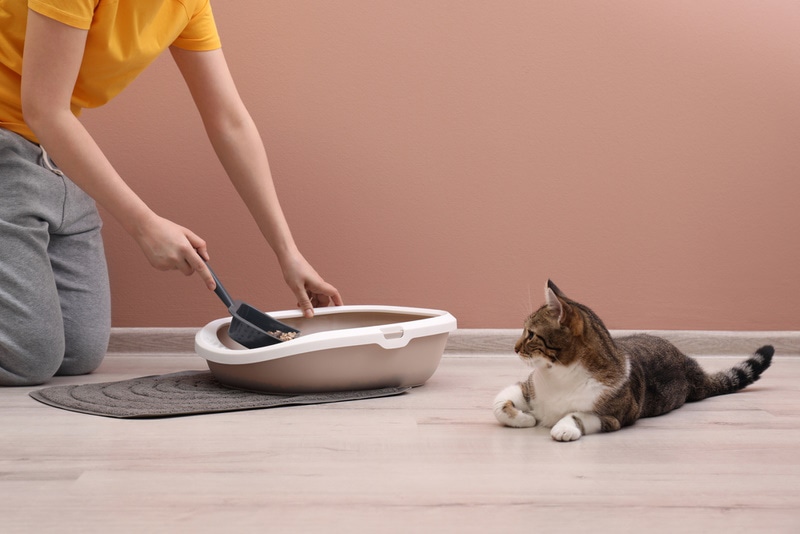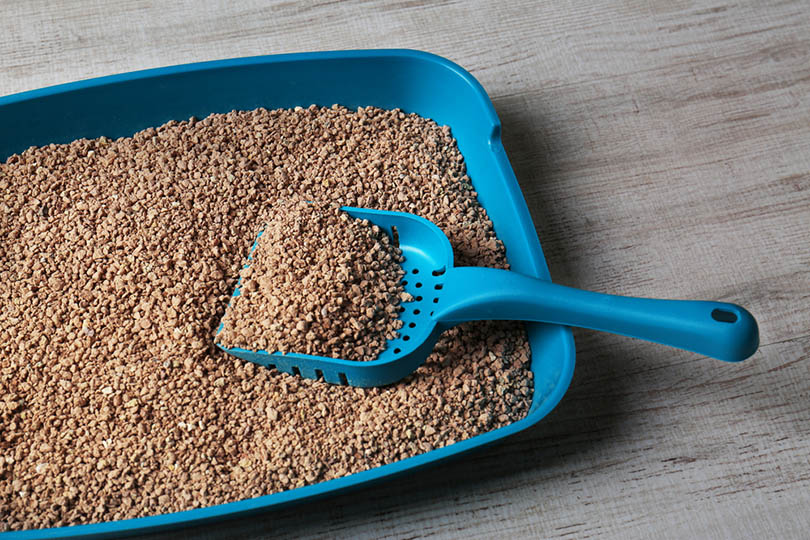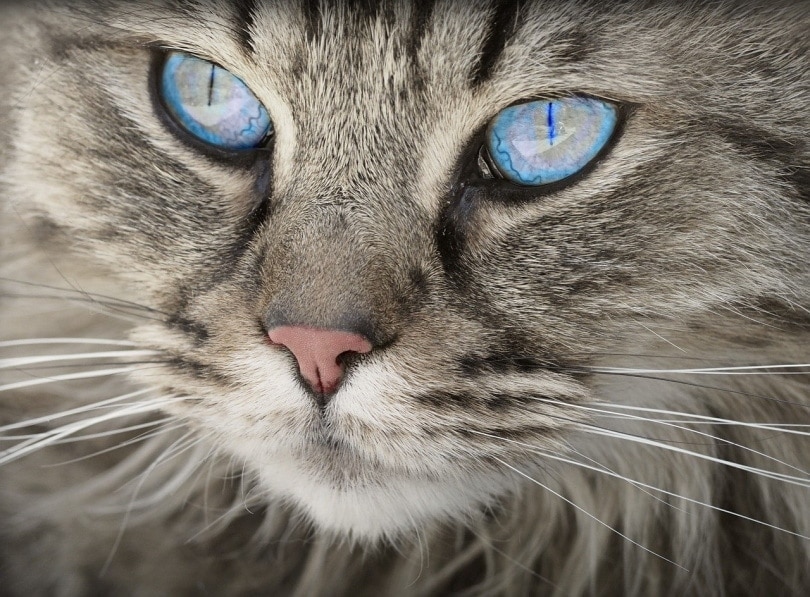Bugs in Cat Litter Box: Vet Approved Facts & Tips to Eliminate Them
By Jordyn Alger
Updated on

Click to Skip Ahead
No one likes litter box duty, but keeping that area clean is integral to cat ownership. Without a clean litter box, your cat may avoid the box entirely and make messes throughout the house. It’s even possible that bugs can infest the litter box. In this article, we’ll examine the bugs that can infiltrate your cat’s litter box as well as how you can eliminate them.
Bugs in Cat’s Litter Box: What Are They?
Bugs of all sorts can get into your cat’s litter box, but there are five pests that most often make their home in your cat’s litter.
- Fleas
- Dust Mites
- Ants
- Flies
- Cockroaches
How to Eliminate Bugs in Cat’s Litter Box
As unpleasant as having bugs in your cat’s litter box is, they can be eliminated. Depending on the insect you’re dealing with, you have to treat them differently.
1. Fleas
Cat owners are no strangers to fleas. These tiny, wingless pests are parasites that feed on the blood of your pet cat. Although small, they can become a big problem and can transmit diseases to your cat and even to you. Adult fleas spend most of their time on your cat, but they lay eggs which can fall off into the environment, including in your cat litter box, hatching when the conditions are right.
Cleaning and dealing with the litter box is only one aspect of dealing with fleas. Getting rid of these parasites will require a concentrated effort in treating both your cat and your home. Consult your vet for the best flea treatment for your pet, then vacuum your home thoroughly to help eradicate any fleas that are lurking in your home.
Be sure to pay special attention to the areas that your car frequents. If the infestation is severe, you’ll probably need your home treated by a pest control technician.
2. Dust Mites
Microscopic house dust mites are present in every home and feed off shed skin scales and dander from pets and humans. For this reason they are usually found in highest concentrations in bedding, soft furnishings and carpets, but may also be found in the litter tray as they thrive in warm, humid environments.
Both humans and cats can be allergic to house dust mites. As well as keeping the litter box clean you can also reduce the levels of dust mites in your home by washing bedding on a hot wash, using allergen proof covers on human and pet bedding and vacuuming regularly with a vacuum that has a HEPA filter.

3. Ants
Ants are pesky pests that can be difficult to get rid of. They are attracted to the odor of your cat’s urine and feces, as well as certain types of cat litter, which is why they are often eager to infest the litter box. They may contaminate your cat’s litter box and can spread bacteria, so it is best to eliminate them as soon as possible.
Getting rid of ants may require the assistance of a pest control professional, especially if the infestation is severe. They often lurk in cracks and crevasses around your home that are hard to get to. Otherwise, dump the old litter, clean and dry your cat’s litter box, and add fresh, ant-free litter.
4. Flies
Flies, like ants, are drawn in by the scent of cat urine and feces. If they lay eggs in your cat’s litter, you may soon have a maggot infestation. Flies in your cat’s litter box can be a serious issue, as they can transmit diseases to cats and humans.
Likewise, they can contaminate food and various surfaces in your home. Cats, particularly those that are weak or debilitated, can become infested with maggots which eat dead or dying tissue.
Keep your cat’s litter box clean and dry to keep flies away. To prevent flies from entering, seal any openings in your home. Moreover, you can use fly traps to catch any remaining flies in the home.

5. Cockroaches
No one wants to deal with cockroaches! Unfortunately, they love to be in warm and humid environments—much like your cat’s litter box. Cockroaches can be a big problem since they can transmit parasites, bacteria, and viruses that can infect you or your cat.
To remove cockroaches, seal any openings in your home to prevent them from getting inside. Likewise, use traps to kill cockroaches already in the home. If the infestation is severe, you may need to rely on the support of a pest control professional.
How to Prevent Bugs From Getting Into Cat’s Litter Box
No one wants to clean bugs out of their cat’s litter box. To avoid the headache, it is best to take preventative measures to eliminate the bugs.
Thankfully, preventing bugs from entering your cat’s litter box is usually relatively easy. By following the steps listed below, you can protect your cat from insects.
Some of these tips will also help reduce the risk from other harmful parasites and bacteria that can be in your cat’s litter tray such as Toxoplasma gondii, roundworms and tapeworms. Always keep your cat on an appropriate deworming program as advised by your vet.
1. Switch to a Different Type of Cat Litter
Bugs are often attracted to organic cat litter, such as corn, wood, walnut, and paper-based litter. By switching your cat litter to a type that bugs are less attracted to, you may be able to keep pests out of the box entirely.

2. Scoop the Cat Litter More Frequently
Bugs are drawn in by the odor of your cat’s urine and feces. The more frequently you clean the litter box, the less odor there will be to attract bugs.
3. Perform Regular Deep Cleanings
In addition to scooping your cat’s litter frequently, you should perform deep cleanings of the litter box. At least twice a month, empty the litter box and wash it out. Then, add fresh litter.
Wondering whether an enzymatic spray or deodorizing powder is better at fighting pet odors? Compare our Pet Stain & Odor Eliminator Spray to our Deodorizer Powder to see which product is best for your deodorizing needs.
Hepper Bio-Enzyme Pet Stain & Odor Eliminator Spray
Hepper Advanced Bio-enzyme Deodorizer & Litter Additive
Eliminates smells
Works inside your cat's litter
Removes stains
Works on contact
Works on a variety of surfaces
Unscented
4. Use A Covered Litter Box
Covered litter boxes can keep insects outside of the box, especially if there is a closable flap door over the entrance.

5. Place The Litter Box in a Well-Ventilated Location
If the litter box is in a humid, poorly ventilated area, insects will be naturally attracted to the box. Keeping the litter box in a dry, well-ventilated location is less appealing to insects. Ideally keep the box on an easy to clean surface rather than carpet. Do not keep or clean your cat’s litter box in the kitchen.
6. Consult Your Vet
If you have tried everything on this list (and perhaps more) and still see no results, contact your vet. They may be able to help you identify the reason why bugs keep returning to your cat’s litter box and provide possible solutions. Be very cautious when using insecticides as many can be very harmful to our pets. Seek advice from your vet before using them or if using a pest control company speak to them about precautions and risks with any products they are using.
Final Thoughts
Cleaning a litter box is an unpleasant duty, especially when it’s infested with bugs. Insects in the litter box are no small matter when it comes to your cat’s health since they can spread disease and contamination. Therefore, when you spot insects inside your cat’s litter box, you should promptly take steps to eradicate them and prevent them from returning.
Featured Image Credit: New Africa, Shutterstock















